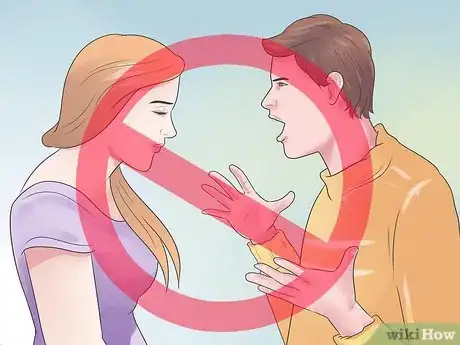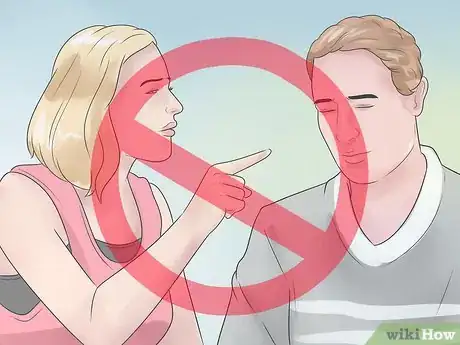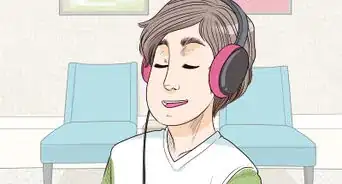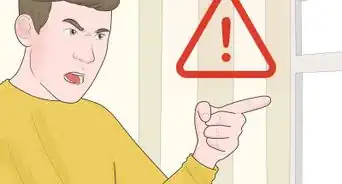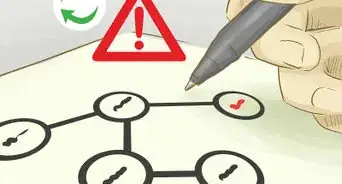This article was co-authored by Michael Stern. Michael Stern is a life coach and the owner of Integral Alignment, a coaching and training business focused on a holistic approach to optimizing one's health, work, love, play, and spirituality. Michael began his professional training in 2011 as an Integral Spiritual Mentor through One Spirit Learning Alliance, and has been certified as both a hatha yoga instructor and an Emotional Intelligence Coach through GolemanEI. In addition to his private 1:1 and groupwork, he has hosted workshops with thought leaders such as Frederic Laloux, Charles Eisenstein, and Thomas Hübl. Michael holds a BA in Spanish Language from Vanderbilt University and lives in Portland, Maine.
wikiHow marks an article as reader-approved once it receives enough positive feedback. In this case, 93% of readers who voted found the article helpful, earning it our reader-approved status.
This article has been viewed 324,692 times.
Are you feeling as surrounded by problems as a superhero by villains? Maybe you just have one big problem but you don't know how to solve it. Don't worry. Whether you're struggling with your significant other or you're in danger of losing your job, there are a few steps that you can take to bring your problems under control.
Steps
Handling Personal Conflicts
-
1Avoid behaviors that make the problem worse. When you're having a problem with someone, first try talking to a person you trust; whether it's a significant other or just a friend, sometimes it's easy to do things that make the problem worse before you have the chance to make them better.
- For example, if you're having a fight with your girlfriend because she thinks you cheated on her (even if you didn't), don't make the problem worse by spending a lot of time out being social with other girls. This will only make you look worse and make it harder to argue with her from the moral high ground. Instead, take a vacation from people until you work things out with her.
- Another example for a problem with a friend is if your best friend is mad at you for blowing off their party in order to spend time with someone else. In this situation, you'll want to avoid seeming distant or disinterested in their feelings. Instead, try to do something nice for them.
-
2Be clear about what the problem is. Avoid arguing because it will only make the other person defensive. Instead, come to a solution for whatever the problem is that the two of you are having. Make sure you understand what's really bothering them first. Sometimes people seem mad about one thing but really they're mad about something else. If you want to really fix the problem, it's a good idea to make sure you're working on the right problem first.
- For example, your boyfriend might say that he's mad you decided to go to the big state school in the next town over instead of going to the local college with him. Of course, you'll still be able to see each other all the time and date without serious problems: what he's really worried about is that all that time off on your own will lead you to meet someone new.
Advertisement -
3Try to see the other perspectives. When you're fighting with someone it's easy to feel that you're right or your way of doing something is best. You're working with your own brain after all. However, people rarely argue with you just to be contrary. They're doing the best that they can with what they know and the situation might look very different from their perspective. Try seeing things from their side of the field in order to help you find a way to meet in the middle.
- Sometimes, if you're having a hard time understanding their perspective, it can be really helpful to just ask them. Ask them to explain, at length, why they think it would be better to take another route. Say something like: “Can you explain your thinking to me? I’d really like to know better.” By walking through their feelings and thought process, you can often gain a better understanding of the problem and how to solve it.[1]
-
4Make sure they feel respected and in control. When people feel disrespected or cornered, they will often become more argumentative and combative, even if they would normally agree with you. If you see a personal situation developing, try taking steps to make that person feel like they have more control and that they are respected. You will find that suddenly they are much more willing to talk.
- For example, you'll want to dial back your language. Don't insult them or use accusatory language like "you should have ______". Instead, use “I” statements to express yourself. Say things like, “I felt hurt after out last conversation,” or, “I get upset when you talk to me like that.”
- Make them feel in control by giving them choices or options, as well as doing things like coming up with what they think is a fair solution to the problem.
-
5Talk it out. Once you've taken those basic first steps towards solving the problem, you should start really talking through a solution. Communication is key here and communication is more than just telling them what you think. You'll want to think before you speak, being careful to think about how what you say comes across. You'll also want to be a really good listener, really focusing on what they're saying and working to understand them.
- For these serious, problem-solving conversations, you should generally set aside a large chunk of time and meet in a place that's private and quiet. This will remove distractions and things which add more stress.
- Talking it out also shows the other person that you have put a priority on making things right, which can earn you some points and soften them up for finding a solution.
-
6Find a middle ground. The solution to more interpersonal conflicts will be a middle ground. This means you're going to have to stop seeing things in black and white. Don't see "my way" and "their way". You're both great people and you have so much to offer each other, so instead talk it out and find "our way" instead.[2]
- For example, if your girlfriend is upset because you can't agree which family to spend Christmas with, you can propose a third option: spending the week before Christmas with her family, the week after with your family, and the day itself with just each other.
- For example, if your friend is upset because they want to take one class with you but you want to take another class instead, you can suggest that you keep your classes separate but both take a study period that you can spend together studying in the library.
Handling Non-People Problems
-
1Stay calm. For problems revolving around stressful, complex situations like getting fired, losing your apartment, or having your car break down, the best place to start is by staying calm. Don't panic or let yourself feel like the whole world is ending. So far, you've managed to get past every other problem in your life and the sun keeps rising; we are 100% sure you can make it through this one too.
- When you're struggling to stay calm, a good technique is to focus on your breathing. Breathe in and out slowly until you feel more calm and ready to do what you need to do.
-
2Get as much information as you can. The more you know about the situation you're in and the options you have available to you, the better able you will be to deal with whatever the problem is. Do a little Googling, talk to people who have dealt with problems like this before, and really think about what Plan C is instead of getting locked into Plans A and B.
- For example, let's say you've lost your job. Instead of panicking about what you're going to do now, go to your local unemployment office. They'll have counselors who will help you file for unemployment and help you find resources for getting a new job quickly (like a resume makeover).[3]
- When trying to solve your problems, think about what is truly authentic to you so you don't spend a lot of time/energy pursuing goals that aren't personally meaningful for you.
-
3Evaluate what resources you have. Everyone has resources available to them in times of crisis. Sometimes these resources come in the form of money or time. Sometimes they come in the form of friends or family who really know what they're talking about. Sometimes the resources you have available to you are harder to see however. Even your personal qualities (such as intelligence or determination) can be hugely helpful in getting you through this.
- For example, if you know you have strong interpersonal skills, then you know you can use those skills to help solve your problem. Just because there might not be an obvious way to use them right now doesn’t mean that the opportunity won’t arise.
-
4Map out what needs to happen. Once you've gotten as much information as you can and know what resources are available to you to make it happen, make your battle plan. There's a reason the military has generals: going in with a plan, even if it's only very basic, is better than just running in and hoping for the best. Make a list of what needs to happen and when. You'll quickly see that it's more doable than you thought.
- Break the solution down into a series of goals, then break the goals down into a series of tasks. Decide when you'll do each task and where you can get a little extra help and before you know it you'll have a great plan. Set goals that are SMART (specific, measurable, attainable, realistic, and time-based).
- Even just having a plan and working towards meeting your goals can often make things even easier because it makes your "gatekeepers" more willing to give you extra room and time to solve your problems. These people, like teachers, bosses, and creditors, will feel more comfortable being forgiving if you have a plan that shows you're serious.
- Be clear on who you are and what you want so you know what to focus on and won't suffer from decision fatigue.[4]
-
5Be ready to act. Now that you know what you need to do, do it! There's no time like the present, as they say. The sooner you start working to fix the problem, the easier it will be to fix it. It's scary to deal with problems because it's so hard to know how things will turn out, but you have to be confident that everything will work out in the end.
- Think of your life like a movie. It's not going to stop just because the villain starts causing trouble. The story might not go how you want it to go but there will be a resolution in the end. And your life is hardly The Day After Tomorrow, so you'll be okay.
-
6Communicate with people. A final piece of advice is that there are few problems which cannot be solved or at least helped by communicating more. People are made to help each other and when you talk about your problems, you'll find that suddenly they become much easier to deal with. Talk with the people attached to the problem that you're having. Talk to people who are experts. Talk to your friends and family. Ask for help. Even just saying what you're struggling with can spur someone to point out a good solution for you.[5]
- Poor communication can also be the source of your problem, meaning that simply talking more may be what's needed to fix the problem.
- If nothing else, communicate the need for patience. Tell people that you're working on the problem but that you have a plan and you're focusing all of your energy on making things right.
Balancing Many Problems
-
1Let go of what you can’t change. When you've got more issues to handle than seems humanly possible, a good place to start is by letting go of the things that you can't change. Often we cling to situations like this, trying to find ways to rewind the clock. This takes away energy from problems that we can actually fix. Focus on moving forward, not on trying to go back.
- Let go of your past. Let go of your mistakes. Instead of hating yourself for them, learn from them. That's enough. Let go of that friend that just refuses to forgive you for whatever it is you did. Instead, focus on solving your other problems and work on making the rest of your life and actions as good as they can be.
- Problems in your past will often come to a better resolution when you work towards a better future...even if that just means you starting to realize that those mistakes don't define you.
- At some point, you'll realize that many of the tools to cultivate a deeper internal sense of peace and fulfillment are within you.[6]
-
2Be ready to make some sacrifices. When you have a lot of problems to deal with, it will pretty much always mean some things are going to have to be sacrificed. You can't usually find a solution that results in everything going 100% your way. This is true even when you only have one problem. Life is hard and you will have to prioritize. [7]
- Figure out what means the most to you and focus on making that happen. Let everything else follow the path of least resistance so that it's not taking up all of your time and energy...even if that means it doesn't end well for you.
- For example, if you're having problems with your family, problems with school, and problems with work, you'll have to choose which is the most important. Generally, your family will always be there and you can get other jobs. Second shots at school, however, are rare.
-
3Stop procrastinating. When we have loads of problems to deal with, it's not uncommon to put off dealing with the issues. You are probably, whether you realize it or not, frozen with fear. What happens if you make the wrong choice? The soon you make the decision, that means that consequences start happening, right? However, putting off making a choice is (in itself) making a choice. Often, that choice will make the problem worse. Don't put problems off. Start working on solving them as soon as you can.
- Think of this like having a giant pile of homework assignments. You can do them right away and not get overwhelmed or you can be afraid of failing and let them pile up. Not doing them just leads to you getting an F anyway. Ignoring them doesn't make them stop appearing.
-
4Take things one step at a time. As you begin to work on solving your giant pile of problems, the best approach is to just take things one step at a time. Look for a first step and take it. Look for the next step and then take that. Don't worry about getting things in the perfect order; you'll find the better way to do things as you go along and we rarely do things perfectly in life anyway.[8]
- Making a chart of the steps you need to take to solve each problem can often be really helpful. This visual device allows you a better way to see how everything fits together.
-
5Get help. This is so important for staying sane and solving problems in the best way. Never feel like you're all alone in the problems that you have to face. You are surrounded by people that love you and want to help you. Even perfect strangers will often help you if you go to the right people. Getting help doesn't make you wrong, weak, or undeserving. Humans are social creatures and we're evolutionarily designed to help each other.
- For example, let's say that you're struggling to figure out how to write a review for work. Go online and you'll find loads of business people who do stuff like that all the time. Post in a forum and you'll see so many people come forward saying things like, "No one ever taught me how to do this and I really wish they had. It doesn't need to be this hard."
-
6Help yourself to see the upsides. Dealing with lots of problems all at once can really drag you down. It's very common to feel hopeless in this situation. It feels like nothing is ever going to change and that this will be your life forever. However, if you keep a positive attitude and stay positive, you'll find those problems flying by before you know it.
- One good approach is to appreciate the problems in your life. If you didn't have problems in your life, you wouldn't know how to recognize the good things that you do have. This is especially true with problems surrounding people we love. We often forget how much we love them until something shows us how much we stand to lose.
Expert Q&A
Did you know you can get expert answers for this article?
Unlock expert answers by supporting wikiHow
-
QuestionHow do I solve my life problems?
 Michael SternMichael Stern is a life coach and the owner of Integral Alignment, a coaching and training business focused on a holistic approach to optimizing one's health, work, love, play, and spirituality. Michael began his professional training in 2011 as an Integral Spiritual Mentor through One Spirit Learning Alliance, and has been certified as both a hatha yoga instructor and an Emotional Intelligence Coach through GolemanEI. In addition to his private 1:1 and groupwork, he has hosted workshops with thought leaders such as Frederic Laloux, Charles Eisenstein, and Thomas Hübl. Michael holds a BA in Spanish Language from Vanderbilt University and lives in Portland, Maine.
Michael SternMichael Stern is a life coach and the owner of Integral Alignment, a coaching and training business focused on a holistic approach to optimizing one's health, work, love, play, and spirituality. Michael began his professional training in 2011 as an Integral Spiritual Mentor through One Spirit Learning Alliance, and has been certified as both a hatha yoga instructor and an Emotional Intelligence Coach through GolemanEI. In addition to his private 1:1 and groupwork, he has hosted workshops with thought leaders such as Frederic Laloux, Charles Eisenstein, and Thomas Hübl. Michael holds a BA in Spanish Language from Vanderbilt University and lives in Portland, Maine.
Life Coach
-
QuestionHow I can deal with more problems everyday?
 Paul Chernyak, LPCPaul Chernyak is a Licensed Professional Counselor in Chicago. He graduated from the American School of Professional Psychology in 2011.
Paul Chernyak, LPCPaul Chernyak is a Licensed Professional Counselor in Chicago. He graduated from the American School of Professional Psychology in 2011.
Licensed Professional Counselor
-
QuestionHow can an interviewer deal with problematic feelings evoked by the interviewee?
 Paul Chernyak, LPCPaul Chernyak is a Licensed Professional Counselor in Chicago. He graduated from the American School of Professional Psychology in 2011.
Paul Chernyak, LPCPaul Chernyak is a Licensed Professional Counselor in Chicago. He graduated from the American School of Professional Psychology in 2011.
Licensed Professional Counselor
Warnings
- Not all problems are for you to sort through. If it is a vital decision you should feel comfortable forwarding it to a superior or discussing it at length with others to arrive at a group decision.⧼thumbs_response⧽
References
- ↑ http://www.techrepublic.com/blog/10-things/10-tips-and-tactics-for-dealing-with-conflict/
- ↑ https://www.edmonds.edu/counseling/documents/conflict.pdf
- ↑ Michael Stern. Life Coach. Expert Interview. 1 July 2020.
- ↑ Michael Stern. Life Coach. Expert Interview. 1 July 2020.
- ↑ http://www.forbes.com/sites/glennllopis/2013/11/04/the-4-most-effective-ways-leaders-solve-problems/
- ↑ Michael Stern. Life Coach. Expert Interview. 1 July 2020.
- ↑ http://www.oprah.com/spirit/What-to-Do-When-You-Are-Overwhelmed
- ↑ http://psychcentral.com/blog/archives/2012/10/16/overwhelmed-these-6-strategies-may-help/
About This Article
If you’re having a problem with another person in your life, first try to identify behaviors that might make the problem worse and avoid them. For example, if your significant other feels like you’re ignoring them, don’t dismiss their feelings or act like it’s no big deal. Once you’ve figured out the root of the problem, sit down and have a talk with the other person without being judgmental or placing the blame on anyone. As you’re talking to them, listen carefully to what they have to say, and try to see all sides of the issue. Then, the two of you can work together to find a solution. Read on for advice on how to deal with non-people problems!
